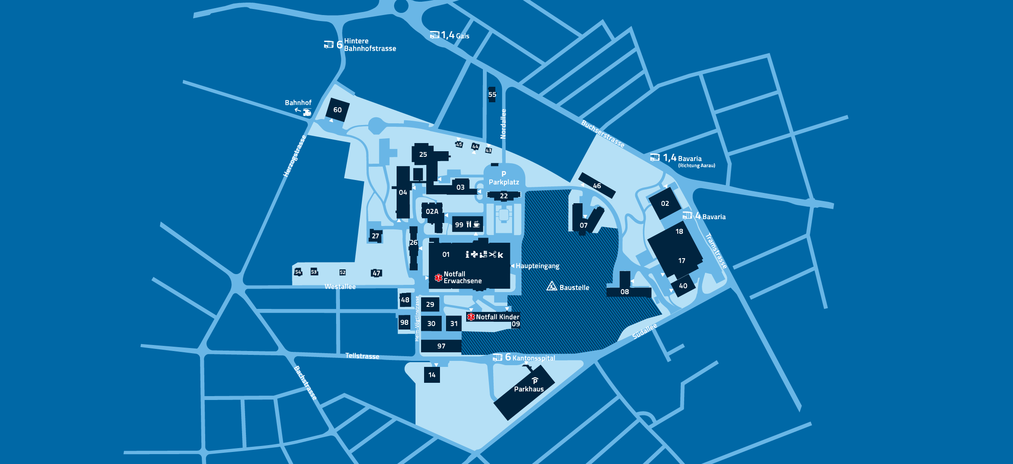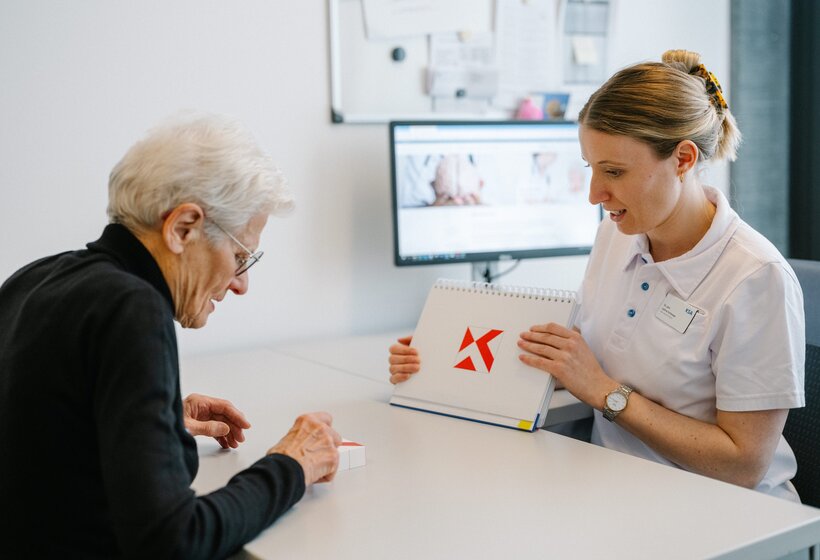Klinik für Neurologie
Ganzheitliche Fachexpertise für neurologische ErkrankungenDie Klinik für Neurologie bietet eine umfassende Diagnostik und Therapiemöglichkeiten bei Erkrankungen des Gehirns, des Rückenmarks, der Nerven und Muskulatur an.
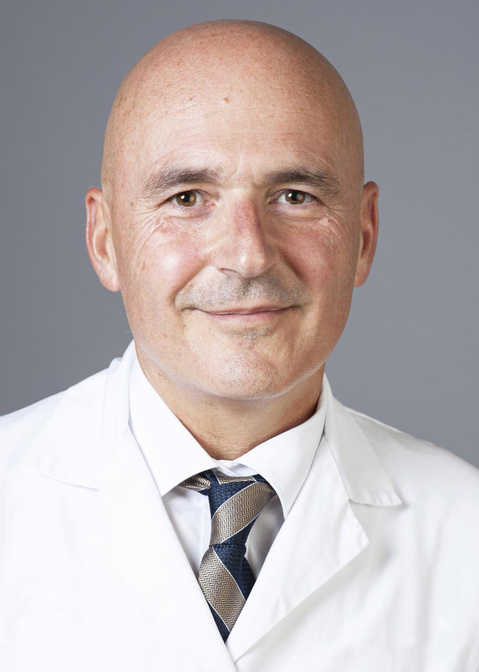
Wir legen grossen Wert darauf, dass Sie sich in unserer Klinik jederzeit bestens versorgt und betreut fühlen. Dafür steht Ihnen mein hochqualifiziertes und multiprofessionelles Team rund um die Uhr zur Seite.
Zu den Schwerpunkten unserer Klinik gehört die Behandlung sowie Abklärung folgender Krankheitsbilder:
• Schlaganfälle
• Anfallsleiden (Epilepsien)
• Entzündungen des Nervensystems (v.a. Multiple Sklerose)
• Bewegungsstörungen (z.B. Parkinson)
• Hirntumoren
• Schwindel
• Schmerz und dementielle Syndrome (z.B. Alzheimer-Erkrankung)
Unser zertifiziertes Stroke Center KSA Aarau verfügt über einen Leistungsauftrag für die hochspezialisierte Behandlung von Hirnschlägen. Darüber hinaus betreiben wir ein zertifiziertes Hirntumorzentrum sowie eine interdisziplinäre Memory Clinic für die Abklärung von Symptomen und Ursachen von kognitiven Beeinträchtigungen.
Wie Sie uns erreichen
-
Chefarztsekretariat | Neurologie
Telefon +41 62 838 66 75E-Mail neurologie@ksa.ch
-
Anmeldung | Neurologie
Telefon 062 838 66 08E-Mail neurologie@ksa.ch
-
Dienstarzt (8-17 Uhr)
Telefon +41 62 838 66 78
-
Dienstarzt (nachts und Feiertage)
Telefon +41 62 838 66 77
Parkinson
Erfahren Sie mehr zu dieser Krankheit und Behandlungsmöglichkeiten auf der Themenseite Parkinson.

Nicht nur Kopfsache
Auf unserer Themenseite werden die neuromedizinischen Disziplinen in den Fokus gerückt. Wir geben Einblick in die Behandlung verschiedener Erkrankungen des Gehirns und der Wirbelsäule. Schauen Sie rein.
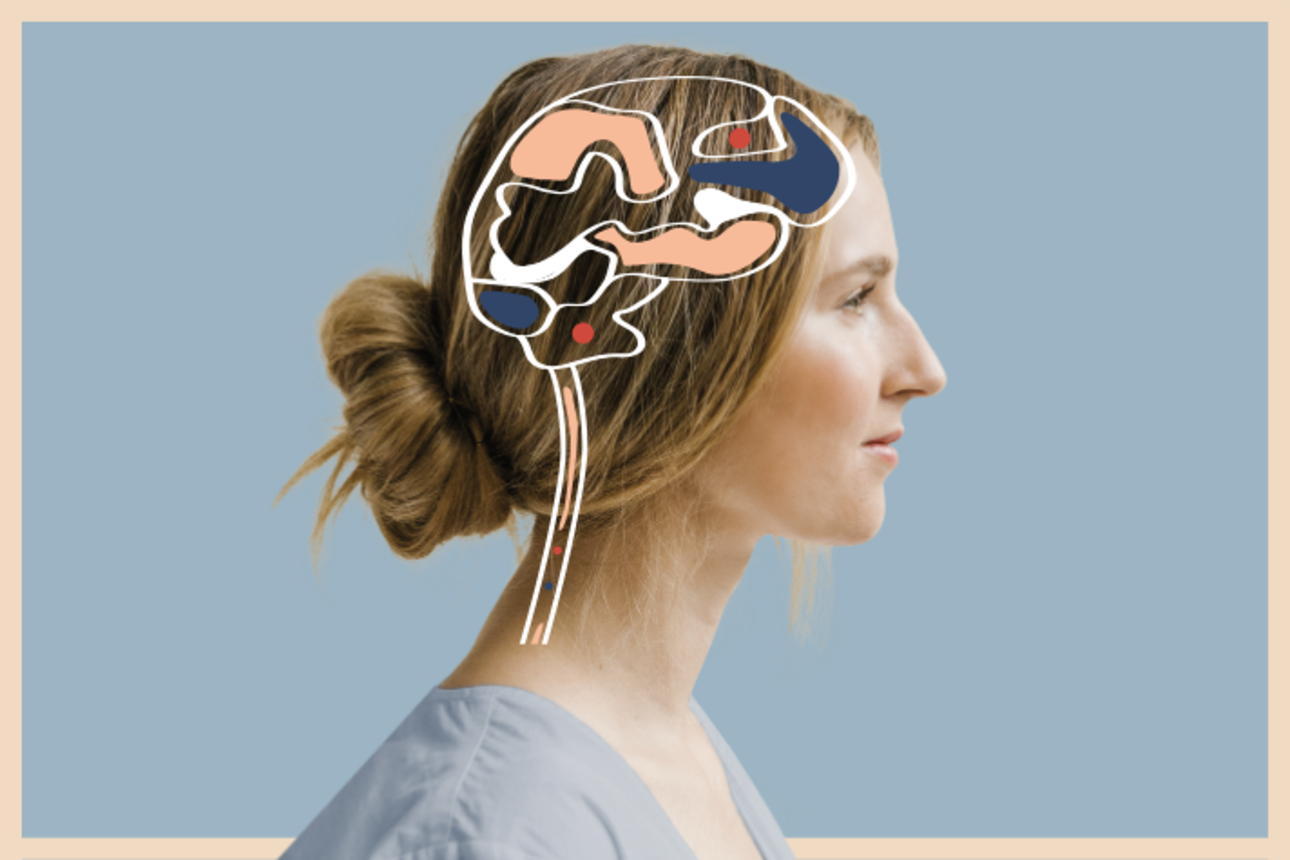
Brainweek
Sie sind an vergangenen Brainweeks interessiert, konnten aber nicht teilnehmen? Kein Problem! Hier finden Sie Informationen und Referate der letzten drei Brainweeks am KSA Aarau.
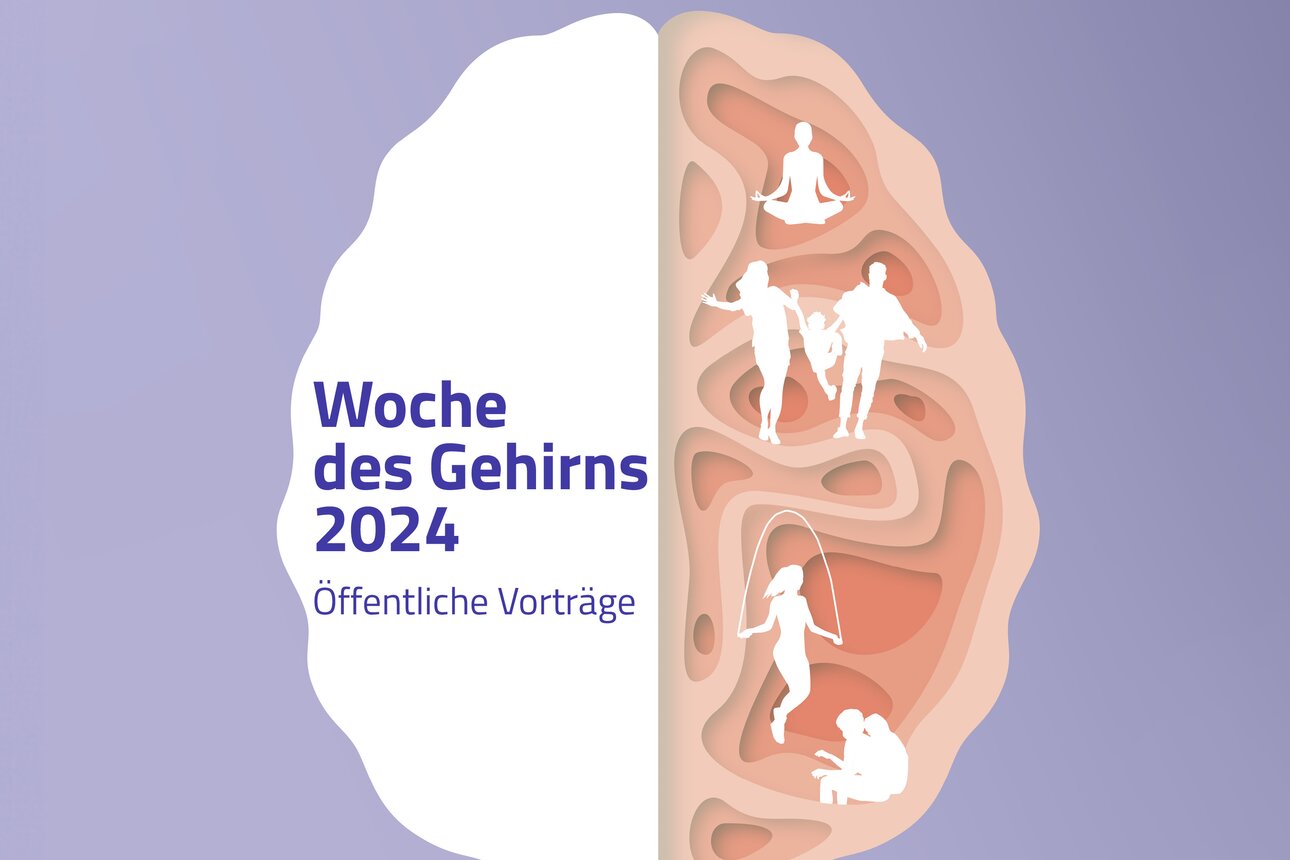
Informationen, Formulare und Publikationen
Häufige Fragen
-
Das klingt nach einem Restless-Leg-Syndrom. Dabei handelt es sich um eine häufige Erkrankung, die für Patientinen und Patienten sehr belastend sein kann. Dies, weil die Symptome den Schlaf stören und Betroffen in der Folge auch tagsüber unter Müdigkeit leiden. Wichtig ist der Ausschluss einer symptomatischen Ursache (Eisenmangel, Polyneuropathie, Radikulopathie etc.) mittels klinischer Untersuchung und Zusatzuntersuchungen wie Laborchemie und Elektroneuromyographie.
-
Nicht jede Form von Vergesslichkeit bedeutet, dass eine Demenz vorliegt. Die Ursachen von Vergesslichkeit können sehr vielfältig sein. Stress und anhaltende psychische Belastungen können vergesslich machen. Auch Müdigkeit, Stoffwechsel- oder hormonelle Störungen können zu einer Einschränkung der Hirnleistung führen. Bei anhaltenden Beschwerden kann die Vergesslichkeit im Rahmen einer neuropsychologischen Untersuchung genau abgeklärt werden.
-
Kopfschmerzen können viele Ursachen haben. Häufige Gründe sind Migräne, Spannungskopfschmerzen oder auch übermässige Schmerzmitteleinnahme. Es können aber auch andere Erkrankungen dafür verantwortlich sein. Für die richtige Diagnose und die optimale Therapie für Sie, empfiehlt sich eine ambulante Abklärung in unserer Kopfschmerzsprechstunde.
Bei neu auftretenden, sehr starken Kopfschmerzen melden Sie sich am besten direkt auf unserem Notfall (Tel. 062 838 66 77). -
Zittern (Tremor) kann ein Symptom verschiedener Krankheiten sein und tritt gelegentlich auch bei Gesunden auf. Je nachdem, in welchen Situationen das Zittern auftritt und wie es sich klinisch präsentiert, kann es Ausdruck einer Parkinson-Krankheit, eines so genannten essentiellen Tremors oder einer anderen Erkrankung sein. Wichtig ist die Abklärung durch einen Spezialisten oder einer Spezialistin in unserer Sprechstunde für Bewegungsstörungen.
-
Schwindel als Symptom kann viele Ursachen haben. Unser Gleichgewichtssystem ist hochkomplex. Die Ursachen können harmlos sein und von einer Störung im Innenohr herrühren, sie können jedoch auch ihren Ursprung im Gehirn haben, z.B. im Rahmen eines Schlaganfalls. Bei plötzlich einsetzendem starkem Schwindel, den Sie so bisher nicht kennen, empfiehlt sich ein direkter Kontakt mit unserem Dienstarzt auf dem Notfall (Tel. 062 838 66 77).
-
Ja. Eine Depression bedeutet eine erhebliche Stresssituation für das Gehirn und führt praktisch immer zu Konzentrationsstörungen und einer Vergesslichkeit, die sich auch im Rahmen einer neuropsychologischen Untersuchung objektivieren lässt. Unter einer Therapie (medikamentös, fachpsychiatrisch/psychotherapeutisch) erholen sich diese Einschränkungen in der Regel vollständig.
-
Genetische und Umweltfaktoren, die auf das Alter Einfluss nehmen, sind leider wenig beeinflussbar. Es ist aber wissenschaftlich erwiesen, dass sich eine gesunde (mediterrane) Ernährung und das konsequente Behandeln von Risikofaktoren des Gefässsystems (Diabetes mellitus, Bluthochdruck, Blutfetterhöhung) positiv auswirken. Auch das Aufrechterhalten eines geregelten Tagesablaufs mit regelmässiger körperlicher Bewegung sowie das Pflegen von Sozialkontakten bis ins hohe Lebensalter können den Alterungsprozess verzögern.
-
Das klingt nach einem Restless-Leg-Syndrom. Dabei handelt es sich um eine häufige Erkrankung, die für Patientinen und Patienten sehr belastend sein kann. Dies, weil die Symptome den Schlaf stören und Betroffen in der Folge auch tagsüber unter Müdigkeit leiden. Wichtig ist der Ausschluss einer symptomatischen Ursache (Eisenmangel, Polyneuropathie, Radikulopathie etc.) mittels klinischer Untersuchung und Zusatzuntersuchungen wie Laborchemie und Elektroneuromyographie.
-
Ja. Das Gehirn ist aufgrund seiner Plastizität bis ins hohe Alter lern- und anpassungsfähig. Einschränkungen der geistigen Leistungsfähigkeit können durch Therapien, wie z.B. Ergotherapie oder Logopädie, verbessert werden. In der akuten Situation ist oft eine stationäre neurologische Rehabilitation notwendig.
-
In einem solchen Fall könnte sich um eine sogenannte zervikale Dystonie handeln. Diese ist bedingt durch ein falsches Zusammenspiel der Muskeln im Bereich von Hals und Nacken und kann zu Kopfschiefhaltung, Krämpfen, aber auch Zittern, begleitet von Schmerzen führen.
In unserer ambulanten Sprechstunde evaluieren wir nach vorgängiger Diagnostik die bestmögliche Therapie für Sie. Möglich sind insbesondere Injektionen von Botulinum-Toxin (Botox). -
Jeder Schlaganfall ist ein Notfall!
Bei einem Schlaganfallverdacht muss sehr schnell gehandelt werden, da die ersten Stunden nach dem Ereignis entscheidend sind, um schwerwiegende Folgen zu verhindern. Dabei zählt jede Minute. Durch ein rasches Handeln und einen frühen Beginn der Therapie können Gehirnzellen vor dem Absterben gerettet und dadurch Komplikationen gemindert werden. Wann immer der Verdacht auf einen Schlaganfall besteht (z.B. plötzlich eintretende Lähmung, Sprach- oder Sprechstörungen, Doppelbilder etc.), gilt es, sofort den Notruf 144 zu wählen und weitere Abklärungen im Spital durchführen zu lassen. -
Diese erfolgt in der Regel interdisziplinär (Neurologen, Neuropsychologen) unter Einbezug der körperlichen und geistigen Beschwerden. Oft ist auch eine neuropsychologische Untersuchung zur Beurteilung geistiger Restfolgen und der Belastbarkeit notwendig. Je nach Schwere der erhobenen Befunde wird eine schrittweise berufliche Reintegration, begleitet von Therapien, besprochen.
-
Der schnellste und effizienteste Weg ist eine Zuweisung via Hausarzt oder Hausärztin. Falls Sie keinen haben, können Sie sich über unsere Notfallnummer +41 62 838 66 77 bei uns melden.
Externe Kooperationen
- Reha Rheinfelden
- Spital Menziken
- Rehaclinic Zurzach
- FRAGILE Aargau/Solothurn Os
- Kantonsspital Luzern
- Universitätsspital Basel
- Hôpitaux Universitaires de Genève
- Universitätsspital Zürich
